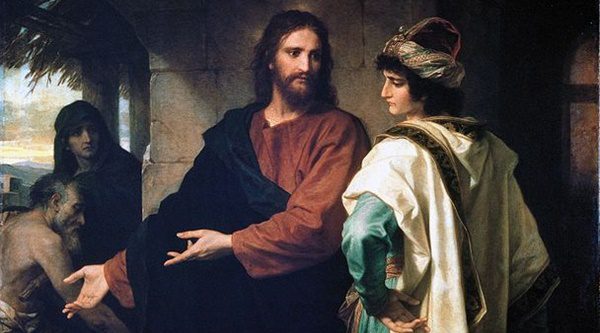Pastors have a frequent question when they begin to discover mimetic theory. “That’s great. But how does it preach?”
Reverend Tom Truby shows that mimetic theory is a powerful tool that enables pastors to preach the Gospel in a way that is meaningful and refreshing to the modern world. Each week, Teaching Nonviolent Atonement will highlight his sermons as an example of preaching the Gospel through mimetic theory.
Mimetic theory teaches that our lives are run by the “Other.” The other can be parents, a spouse, children, or a boss, but the “Other” is also our cultural environment. Mimetic theory helps open our eyes to all the influences around us. Once our eyes are opened, we can consciously choose whom to put at the center of our lives. In this sermon, Reverends Tom and Laura Truby explain the importance of putting Jesus at the center.
Year A, Pentecost 4, Proper 8
July 2nd, 2017
Matthew 10:40-42
Thomas and Laura Truby
A Warm Smile, a Solid Handshake and a Sure Hope
Last week’s lection ended with this perplexing paragraph:
Those who love father or mother more than me aren’t worthy of me. Those who love son or daughter more than me aren’t worthy of me. Those who don’t pick up their crosses and follow me aren’t worthy of me. Those who find their lives will lose them, and those who lose their lives because of me will find them.
This week’s lection picks up here. Assuming these are not a random series of statements Matthew has put together, leftovers from the Sermon on the Mount, what is the connection between these verses and today’s reading from Matthew?
For me, the first sentence “Those who love father or mother more than me aren’t worthy of me” means Jesus is worthy of being the center of our lives and as center he is worthy of being more important than any other relationship. For example, if we are having trouble with a mother or a father, in our minds we talk it over with Jesus in our process of assessing what to do and how to think about it. Even children can do this. With Jesus as our center, there is always someone to talk to, even about our most intimate and important relationships. Let’s say we are worried about our mate’s health and we don’t want to bring it up with them. We can talk it through in the privacy of our relationship with Jesus. Maybe we are just talking to our self, but somehow I think it is more.
Or, maybe we see a pattern in our children’s lives that disturbs us and yet we don’t want to become an interfering parent or a meddling in-law. Having Jesus as the relational center of our network of relationships gives us a place to figure out our concerns, explore their dimensions, and question whether it is us or them—maybe we are looking at it through our own experience and our experience is very different than theirs. If we make our relationship with our parents, our children or anyone else more important than Jesus we lose this “sit spot” for calm reflection. If we really believe that Jesus is who Jesus says he is, as I do, his presence at the center of our lives gives us great gravitas, peace, hope and stability though never absolute certainty. We are not running our lives alone. We have a partner who always brings another perspective. How many of you have prayed to Jesus or God about some person or situation that was troubling you? Most of us have.
So when Jesus says “those who love father or mother more than me aren’t worthy of me” he isn’t saying he is a jealous and exclusive lover, he is saying that if he is the center his presence provides us an anchor point. We have a safe place for reflection on ourselves and others who share life with us. We tap into a source of courage and strength available to us without which we lose perspective and can become reactive, even mean, without knowing it. Having Jesus as a dialogue partner can make it possible for us to love in a way that the other experiences as love. It helps us to forgive things the other does that we don’t like. It helps us to see the other with clearer eyes. Jesus wants to be the center for our sake.
Jesus is worthy of being leaned on with all our weight. He won’t crumble, dissolve or distort under pressure. All others eventually will. We are all just human but Jesus comes from another place, a place beyond rivalry, even the rivalry between generations and between genders. In summary, when we put Jesus first, we have a calm place to dwell.
Jesus next said “Those who don’t pick up their cross and follow me are not worthy of me.” When Jesus picked up his cross he was laying down all power and embracing powerlessness. Paradoxically, his willingness to lay down all power made him worthy to be followed. He was modeling himself after God in doing this. Jesus is the ultimate respecter of other’s freedom. His is a way that relinquishes control, coercion and violence; centers on his suffering rather than his causing others to suffer; and is energized by forgiveness. He releases negative energy as quickly as it generates. Those who wish to follow him need to pick up this same cross to be worthy of their master. None of us is worthy but it is the direction we are moving. To the extent we follow him; we will have to relinquish power.
To renounce power over others is to lose our life as we know it and to find it where we didn’t know it could exist. We all think our capacity to impact the world and people around us makes us important. But in thinking that we curtail, distort or maybe sever our relationship to God. It is only when we are yielded to God, compliant and trusting toward our Creator, that we discover life. In this yielded, humble, trusting, open, joyous and grateful living our bodies relax and our spirits soar. We are now living in discipleship and ready to enter this week’s short gospel lection.
We are disciples of Jesus. If we trust him we have made him the center of our network of relationships. He is the hub around which every other relationship revolves. Nothing has direct access to us without going through him. The disciple and Jesus are this tight twosome that mirrors the threesome in the Trinity. We agree with Paul who said “for me to live is Christ.” The disciple’s world, both inner and outer, is being transformed by having Jesus as the center. Even our understanding of history, current events and the future of the church are altered by the inclusion of the gospel-revealed Jesus.
We are persons in the midst of profound change such that everything is different than what we had thought. When we meet other people, moving as we are in a new direction, Jesus tells us there is something to know about ourselves: “Those who receive you are receiving me, and those who receive me are receiving the one who sent me.” We are not only presenting them with our new self, we are presenting them with Jesus who is being filtered through us. This Jesus seeping out through us is bringing us all an experience of the true God who is nothing but love. Does that not give all our relationships far more significance? We are part of this; it’s happening to us and through us and it’s big. Maybe being a disciple is worth it!
There are rewards to this; it isn’t all suffering and being humbled! “Those who receive a prophet as a prophet will receive a prophet’s reward,” Jesus said. Clearly Jesus is a prophet, one who reveals truth and we are the prophet’s disciples who get to marvel at the grace of it and live in its revelation. “Those who receive a righteous person as a righteous person will receive a righteous person’s reward.” We are the disciples of a truly righteous person, a person in right relation with every other person on the planet. This righteous one is showing everyone on earth they are loved and not excluded. As his disciples we live with this knowledge, it is being etched into our DNA. Perhaps this living awareness is our reward!
Finally, Jesus assures his disciples that anyone who helps them, who even gives them a cup of cold water, will certainly be rewarded. It’s interesting that he describes his followers as “the little ones.” We are little because we are vulnerable, weak and powerless just like our master. We are just like the majority in our brutal, evil and violent world. Jesus’ disciples don’t escape the real world. But they are able to live in it with a warm smile, a solid handshake and a sure hope. Thanks be to God.
Image: Flickr, polsifter, creative commons licesnse.
Stay in the loop! Like Teaching Nonviolent Atonement on Facebook!












